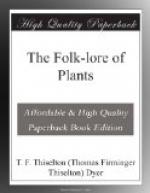With which may be compared the phrase:—
“You give me coloquintida (colocynth) for Herb-John.”
Those who reap advantage from another man’s labour are said to “put their sickle into another man’s corn,” and the various surroundings of royalty, however insignificant they may be, are generally better, says the proverb, than the best thing of the subjects:—
“The king’s chaff is better than other people’s corn.”
Among the proverbs relating to grass may be mentioned the popular one, “He does not let the grass grow under his feet;” another old version of which is, “No grass grows on his heel.” Another well-known adage reminds us that:—
“The higher the hill the lower the grass.”
And equally familiar is the following:—
“While the grass groweth the seely horse starveth.”
In connection with hops, the proverb runs that “hops make or break;” and no hop-grower, writes,
Mr. Hazlitt,[3] “will have much difficulty in appreciating this proverbial dictum. An estate has been lost or won in the course of a single season; but the hop is an expensive plant to rear, and a bad year may spoil the entire crop.”
Actions which produce different results to what are expected are thus spoken of:—
“You set saffron and there came up wolfsbane.”
In Devonshire it may be noted that this plant is used to denote anything of value; and it is related of a farmer near Exeter who, when praising a certain farm, remarked, “’Tis a very pretty little place; he’d let so dear as saffron.”
Many, again, are the proverbial sayings associated with roses—most of these being employed to indicate what is not only sweet and lovely, but bright and joyous. Thus, there are the well-known phrases, “A bed of roses,” and “As sweet as a rose,” and the oft-quoted popular adage:—
“The rose, called by any other name, would smell as sweet,”
Which, as Mr. Hazlitt remarks, “although not originally proverbial, or in its nature, or even in the poet’s intention so, has acquired that character by long custom.”
An old adage, which is still credited by certain of our country folk, reminds us that:—
“A parsley field will bring a man
to his saddle and a woman to
her grave,”
A warning which is not unlike one current in Surrey and other southern counties:—
“Where parsley’s grown in
the garden, there’ll be a death before
the year’s out.”
In Devonshire it has long been held unlucky to transplant parsley, and a poor woman in the neighbourhood of Morwenstow attributed a certain stroke with which one of her children had been afflicted after whooping-cough to the unfortunate undoing of the parsley bed. In the “Folk-lore Record,” too, an amusing instance is related of a gardener at Southampton, who, for the same reason, refused to sow some parsley seed. It may be noted that from a very early




